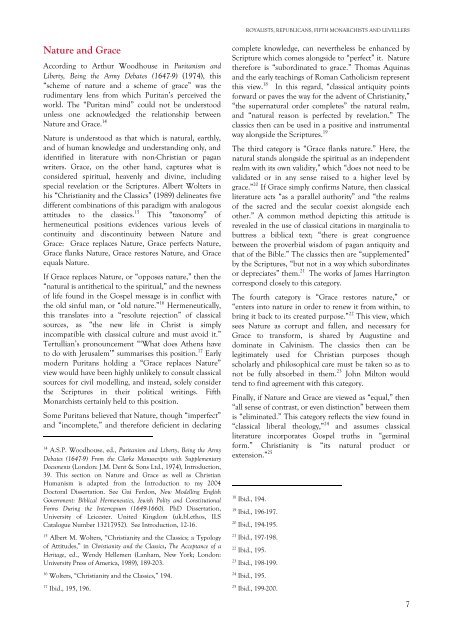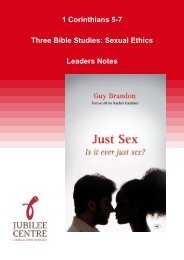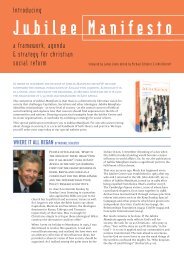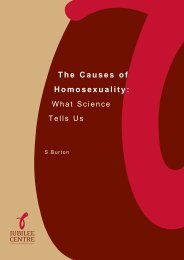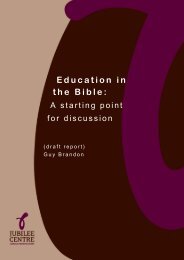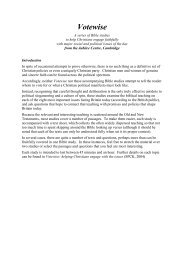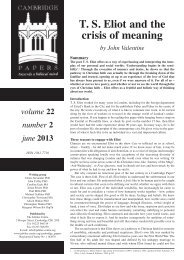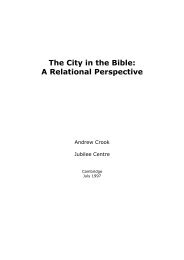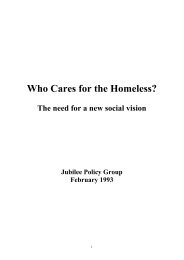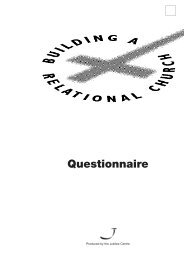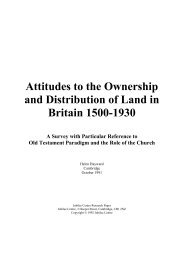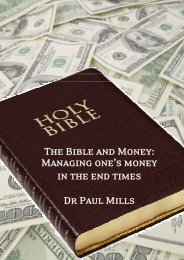Report Template - Jubilee Centre
Report Template - Jubilee Centre
Report Template - Jubilee Centre
Create successful ePaper yourself
Turn your PDF publications into a flip-book with our unique Google optimized e-Paper software.
ROYALISTS, REPUBLICANS, FIFTH MONARCHISTS AND LEVELLERS<br />
Nature and Grace<br />
According to Arthur Woodhouse in Puritanism and<br />
Liberty, Being the Army Debates (1647-9) (1974), this<br />
“scheme of nature and a scheme of grace” was the<br />
rudimentary lens from which Puritan’s perceived the<br />
world. The “Puritan mind” could not be understood<br />
unless one acknowledged the relationship between<br />
Nature and Grace. 14<br />
Nature is understood as that which is natural, earthly,<br />
and of human knowledge and understanding only, and<br />
identified in literature with non-Christian or pagan<br />
writers. Grace, on the other hand, captures what is<br />
considered spiritual, heavenly and divine, including<br />
special revelation or the Scriptures. Albert Wolters in<br />
his “Christianity and the Classics” (1989) delineates five<br />
different combinations of this paradigm with analogous<br />
attitudes to the classics. 15 This “taxonomy” of<br />
hermeneutical positions evidences various levels of<br />
continuity and discontinuity between Nature and<br />
Grace: Grace replaces Nature, Grace perfects Nature,<br />
Grace flanks Nature, Grace restores Nature, and Grace<br />
equals Nature.<br />
If Grace replaces Nature, or “opposes nature,” then the<br />
“natural is antithetical to the spiritual,” and the newness<br />
of life found in the Gospel message is in conflict with<br />
the old sinful man, or “old nature.” 16 Hermeneutically,<br />
this translates into a “resolute rejection” of classical<br />
sources, as “the new life in Christ is simply<br />
incompatible with classical culture and must avoid it.”<br />
Tertullian’s pronouncement “‘What does Athens have<br />
to do with Jerusalem’” summarises this position. 17 Early<br />
modern Puritans holding a “Grace replaces Nature”<br />
view would have been highly unlikely to consult classical<br />
sources for civil modelling, and instead, solely consider<br />
the Scriptures in their political writings. Fifth<br />
Monarchists certainly held to this position.<br />
Some Puritans believed that Nature, though “imperfect”<br />
and “incomplete,” and therefore deficient in declaring<br />
14<br />
A.S.P. Woodhouse, ed., Puritanism and Liberty, Being the Army<br />
Debates (1647-9) From the Clarke Manuscripts with Supplementary<br />
Documents (London: J.M. Dent & Sons Ltd., 1974), Introduction,<br />
39. This section on Nature and Grace as well as Christian<br />
Humanism is adapted from the Introduction to my 2004<br />
Doctoral Dissertation. See Gai Ferdon, New Modelling English<br />
Government: Biblical Hermeneutics, Jewish Polity and Constitutional<br />
Forms During the Interregnum (1649-1660). PhD Dissertation,<br />
University of Leicester. United Kingdom (uk.bl.ethos, ILS<br />
Catalogue Number 13217952). See Introduction, 12-16.<br />
15<br />
Albert M. Wolters, “Christianity and the Classics; a Typology<br />
of Attitudes,” in Christianity and the Classics, The Acceptance of a<br />
Heritage, ed., Wendy Hellemen (Lanham, New York; London:<br />
University Press of America, 1989), 189-203.<br />
16<br />
Wolters, “Christianity and the Classics,” 194.<br />
17<br />
Ibid., 195, 196.<br />
complete knowledge, can nevertheless be enhanced by<br />
Scripture which comes alongside to “perfect” it. Nature<br />
therefore is “subordinated to grace.” Thomas Aquinas<br />
and the early teachings of Roman Catholicism represent<br />
this view. 18 In this regard, “classical antiquity points<br />
forward or paves the way for the advent of Christianity,”<br />
“the supernatural order completes” the natural realm,<br />
and “natural reason is perfected by revelation.” The<br />
classics then can be used in a positive and instrumental<br />
way alongside the Scriptures. 19<br />
The third category is “Grace flanks nature.” Here, the<br />
natural stands alongside the spiritual as an independent<br />
realm with its own validity,” which “does not need to be<br />
validated or in any sense raised to a higher level by<br />
grace.” 20 If Grace simply confirms Nature, then classical<br />
literature acts “as a parallel authority” and “the realms<br />
of the sacred and the secular coexist alongside each<br />
other.” A common method depicting this attitude is<br />
revealed in the use of classical citations in marginalia to<br />
buttress a biblical text; “there is great congruence<br />
between the proverbial wisdom of pagan antiquity and<br />
that of the Bible.” The classics then are “supplemented”<br />
by the Scriptures, “but not in a way which subordinates<br />
or depreciates” them. 21 The works of James Harrington<br />
correspond closely to this category.<br />
The fourth category is “Grace restores nature,” or<br />
“enters into nature in order to renew it from within, to<br />
bring it back to its created purpose.” 22 This view, which<br />
sees Nature as corrupt and fallen, and necessary for<br />
Grace to transform, is shared by Augustine and<br />
dominate in Calvinism. The classics then can be<br />
legitimately used for Christian purposes though<br />
scholarly and philosophical care must be taken so as to<br />
not be fully absorbed in them. 23 John Milton would<br />
tend to find agreement with this category.<br />
Finally, if Nature and Grace are viewed as “equal,” then<br />
“all sense of contrast, or even distinction” between them<br />
is “eliminated.” This category reflects the view found in<br />
“classical liberal theology,” 24 and assumes classical<br />
literature incorporates Gospel truths in “germinal<br />
form.” Christianity is “its natural product or<br />
extension.” 25<br />
18<br />
Ibid., 194.<br />
19<br />
Ibid., 196-197.<br />
20<br />
Ibid., 194-195.<br />
21<br />
Ibid., 197-198.<br />
22<br />
Ibid., 195.<br />
23<br />
Ibid., 198-199.<br />
24<br />
Ibid., 195.<br />
25<br />
Ibid., 199-200.<br />
7


